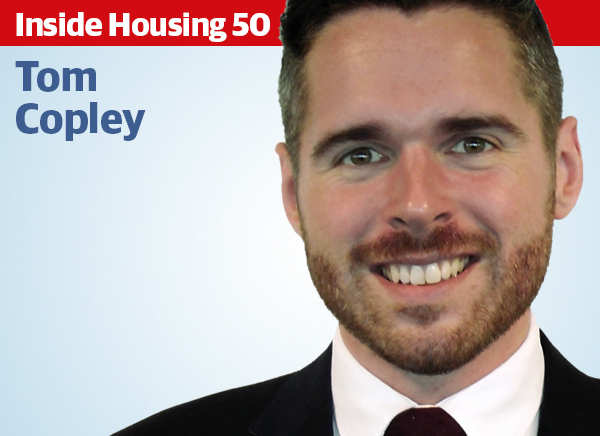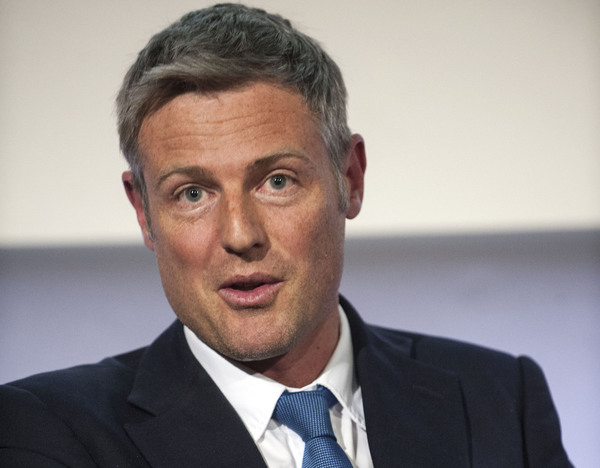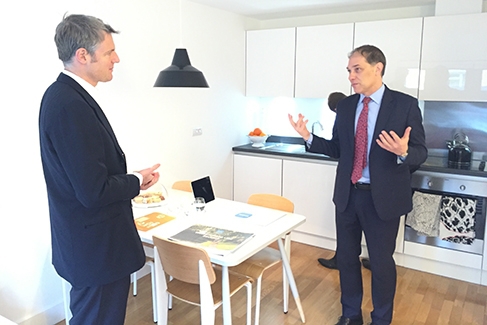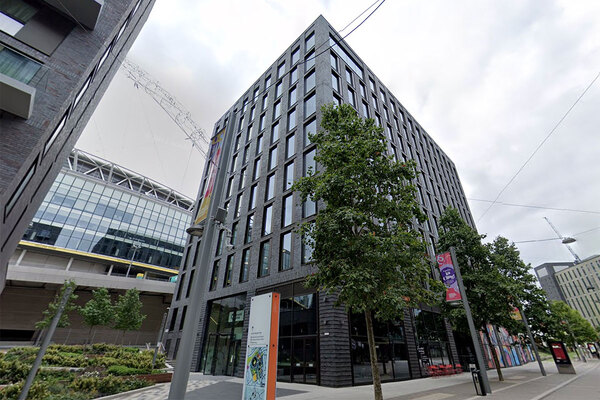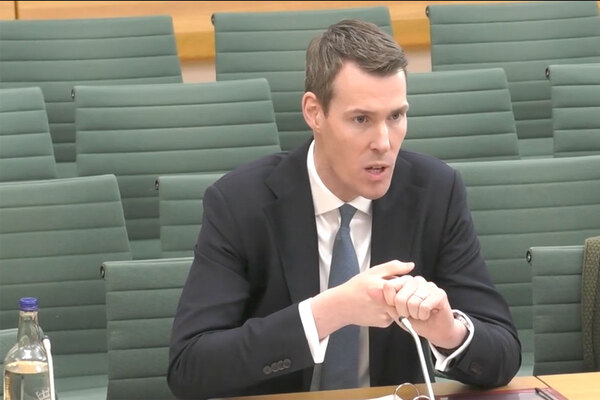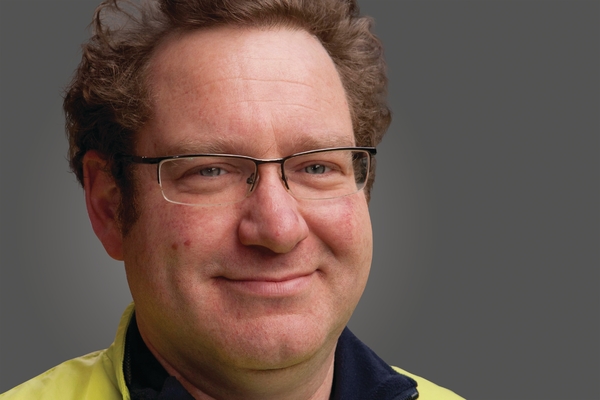Zac in a box
As Conservative Zac Goldsmith officially launches his campaign to be elected mayor of London, Heather Spurr meets him in a very small kitchen to discuss his housing plans
Video:
features code

Source: Getty
Queen’s Crescent, in Kentish Town, north London, is a historically scruffy street. Old fruit spills on the floor outside the fruit and veg shop, as the area takes a rest from the frantic twice-weekly market that is one of London’s oldest. More recently the area has become a symbol of unaffordable London. Prices in NW5 have steadily eclipsed what most Londoners can pay, and two-bedroom flats are on sale around the corner for nearly £800,000.
In a very small flat just off a side street sits a man who thinks he can begin to solve London’s housing crisis.
Video:
Ad slot
Zac Goldsmith, the Conservative candidate for London mayor, has a demanding schedule in the run-up to the election. His aides whisper forceful instructions to Inside Housing ensuring our interview lasts no more than 10 minutes. And his tour around affordable housing developer Pocket’s show flat today is already running late after he stops to pose for photos on scaffolding outside – in the obligatory hard hat and hi-vis vest.
Lobby to change
“You need to cater for people across the whole income spectrum.”
Once inside, Mr Goldsmith dominates the room – by necessity as well as design. His tall frame fills the one-bedroom flat, complete with a low red sofa and dinky lampshade – designed to make the most out of the space.
Pocket’s properties are small enough – the clue’s in the name – that they are sometimes referred to as ‘micro flats’. Given his visit, is this the kind of home Mr Goldsmith foresees meeting London’s needs in the future?
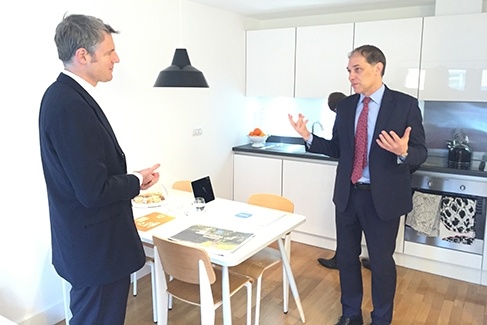
Zac Goldsmith (left) taking a tour of Pocket’s show flat
Mr Goldsmith smiles and answers in a measured manner. As a wealthy aristocrat competing against Labour’s Sadiq Khan, who grew up on a council estate, he navigates difficult waters when it comes to identifying with ‘ordinary Londoners’.
“You need to cater for people across the whole income spectrum,” he insists. He claims London is a capital of “two extremes” – very wealthy people able to buy, and those poor enough to qualify for social housing. He thinks developments such as this one, which is 20% below market value, and government initiatives for the expansion of shared ownership will begin to redress the balance.
“If you’re a doctor or a nurse or a fireman or a policeman and you can’t afford to end up owning a home in London, then that is a problem,” he says. “In my view, that’s a reflection of the market failure.”
Mr Goldsmith, 41, has a collected and competent manner. It seems to be effective with David Cameron, who bowed to his lobbying to change the Housing and Planning Bill to stem the loss of affordable housing in the capital. It was not all his work. City Hall and Boris Johnson have both raised serious concerns about the Bill’s measure to force councils to sell their expensive, empty housing stock. This month the government accepted Mr Goldsmith’s amendment aiming to ensure the replacement of two affordable homes for every high-value council home sold.
“I haven’t made housing a priority – housing is a priority.”
It enabled the mayoral candidate to demonstrate that he was helping to change government policy in favour of London before the election ballot papers were even sent out.
But his rival Mr Khan has labelled the amendment “a con”, because it allows the two replacement homes to be potentially unaffordable properties, such as Starter Homes.
“When he talks about two-for-one, what does he mean?” asks Rod Cahill, chief executive of housing association Catalyst.
Mr Goldsmith acknowledges the amendment is “a very top-line commitment”, but he is also clear Starter Homes are only “one part of the story”. He has raised concerns about the affordability of Starter Homes – which offer 20% discounts to first-time buyers on homes worth up to £450,000 – in the House of Commons.
There are also signs that he is more in favour of funding for affordable rented homes than his Conservative colleagues in the Treasury – at least in central London areas. The government shifted nearly all of the funding for affordable rent to homeownership products in the Spending Review. However, Mr Goldsmith calls it “misleading” to “pretend” that people in expensive boroughs can have the same homeownership aspirations as in cheaper areas.
“In places such as Westminster, for example, [when] I think we are talking about affordability, it has to be about rent,” he adds. He says that in these areas, levels of rent should be no more than a third of people’s incomes.
Valuable resource
Housing associations may also be cheered by his regard for social housing. “I think of it as an extraordinarily valuable resource for people who without it would be stuffed.”
Mr Khan, of course, memorably said he wanted to make the mayoral election a “referendum on housing”. Is Mr Goldsmith going to give it a similar focus?
“I haven’t made housing a priority – housing is a priority,” he responds.
There is an air of pragmatism about Mr Goldsmith’s campaign, however. This is apparent when he expresses his unease with the government’s threshold for the Pay to Stay policy. Under the scheme, a couple earning £20,000 each in London will be deemed ‘high-income tenants’ and will be forced to pay market rent. He says: “I’m not going to tell you… £40,000 joint earnings for a couple is a high salary. In part of the world, it is. In London, it ain’t.” Yet when pressed on what he would do about it, he finds it difficult to reply. “I accept the government is working in difficult constraints,” he mumbles.
For all the political calculations, Mr Goldsmith knows he has to look like he’s got a better shot at fixing the housing shortage if he wants to beat Mr Khan. The stakes are high.
“Whoever the next mayor is, they are going to have to really throw the kitchen sink at beginning to solve this crisis,” he declares.
Zac Goldsmith’s housing policies
- A target of 50,000 homes a year for London
- A pan-London investment fund for overseas investors to finance new homes
- Focus on releasing publicly-owned brownfield land
- Putting empty homes back on the market
- A London-first bias for new developments
- Give communities a vote to require the mayor to call in significant developments
- Longer-term private rented sector tenancies and more certainty over rent increases
- Ensure rogue landlords are brought to justice
